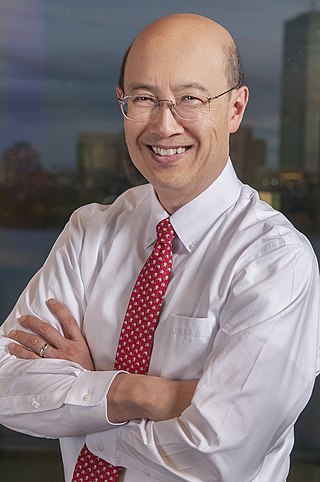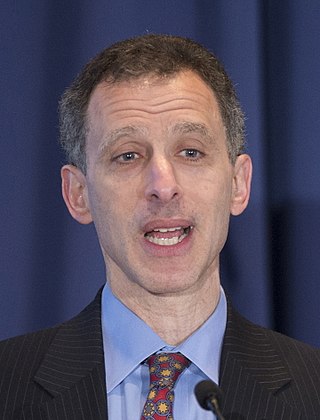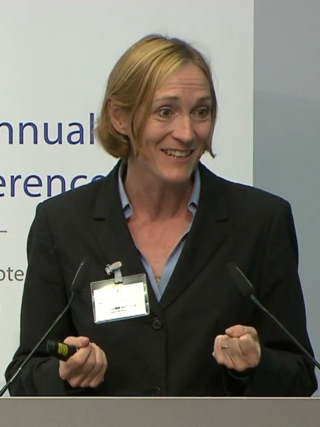Related Research Articles

Robert Cox Merton is an American economist, Nobel Memorial Prize in Economic Sciences laureate, and professor at the MIT Sloan School of Management, known for his pioneering contributions to continuous-time finance, especially the first continuous-time option pricing model, the Black–Scholes–Merton model. In 1997 Merton together with Myron Scholes were awarded the Bank of Sweden Prize in Economic Sciences in Memory of Alfred Nobel for the method to determine the value of derivatives.

Myron Samuel Scholes is a Canadian–American financial economist. Scholes is the Frank E. Buck Professor of Finance, Emeritus, at the Stanford Graduate School of Business, Nobel Laureate in Economic Sciences, and co-originator of the Black–Scholes options pricing model. Scholes is currently the chairman of the Board of Economic Advisers of Stamos Capital Partners. Previously he served as the chairman of Platinum Grove Asset Management and on the Dimensional Fund Advisors board of directors, American Century Mutual Fund board of directors and the Cutwater Advisory Board. He was a principal and limited partner at Long-Term Capital Management (LTCM), a highly leveraged hedge fund that collapsed in 1998, and a managing director at Salomon Brothers. Other positions Scholes held include the Edward Eagle Brown Professor of Finance at the University of Chicago, senior research fellow at the Hoover Institution, director of the Center for Research in Security Prices, and professor of finance at MIT's Sloan School of Management. Scholes earned his PhD at the University of Chicago.
Stephen Alan "Steve" Ross was the inaugural Franco Modigliani Professor of Financial Economics at the MIT Sloan School of Management after a long career as the Sterling Professor of Economics and Finance at the Yale School of Management. He is known for initiating several important theories and models in financial economics. He was a widely published author in finance and economics, and was a coauthor of a best-selling Corporate Finance textbook.
Kenneth Ronald "Ken" French is the Roth Family Distinguished Professor of Finance at the Tuck School of Business, Dartmouth College. He has previously been a faculty member at MIT, the Yale School of Management, and the University of Chicago Booth School of Business.

Jean Tirole is a French economist who is currently a professor of economics at Toulouse 1 Capitole University. He focuses on industrial organization, game theory, banking and finance, and psychology. In particular, he focuses on the regulation of economic activity in a way that does not hinder innovation while maintaining fair rules.

Bengt Robert Holmström is a Finnish economist who is currently Paul A. Samuelson Professor of Economics (Emeritus) at the Massachusetts Institute of Technology. Together with Oliver Hart, he received the Central Bank of Sweden Nobel Memorial Prize in Economic Sciences in 2016.
The Deutsche Bank Prize in Financial Economics honors renowned researchers who have made influential contributions to the fields of finance and money and macroeconomics, and whose work has led to practical and policy-relevant results. It was awarded biannually from 2005 to 2015 by the Center for Financial Studies (CFS), in partnership with Goethe University Frankfurt, and is sponsored by Deutsche Bank Donation Fund. The award carried an endowment of €50,000, which was donated by the Stiftungsfonds Deutsche Bank im Stifterverband für die Deutsche Wissenschaft.

Andrew Wen-Chuan Lo is a Hong Kong-born American economist and academic who is the Charles E. and Susan T. Harris Professor of Finance at the MIT Sloan School of Management. Lo is the author of many academic articles in finance and financial economics. He founded AlphaSimplex Group in 1999 and served as chairman and chief investment strategist until 2018 when he transitioned to his current role as chairman emeritus and senior advisor.
Alexander Ljungqvist is a Swedish economist, educator, scholar, writer, and speaker. He is a professor of finance at the Stockholm School of Economics, where he is the inaugural holder of the Stefan Persson Family Chair in Entrepreneurial Finance. His areas of expertise include corporate finance, investment banking, initial public offerings, entrepreneurial finance, private equity, venture capital, corporate governance, and asset pricing. Professor Ljungqvist teaches Master's, MBA, and executive courses in private equity and venture capital and a PhD course in corporate finance.

Markus Konrad Brunnermeier is an economist, who is the Edwards S. Sanford Professor of Economics at Princeton University.
Michael J. Brennan is emeritus professor of finance at the UCLA Anderson School of Management. Brennan co-designed the Brennan-Schwartz interest rate model and was a pioneer of real options theory. His writings on real options and asset pricing, corporate finance, derivative securities, market microstructure, the role of information in capital markets, and risk management have been published extensively.

Jeremy Chaim Stein is an American economist and the Moise Y. Safra Professor of Economics at Harvard University; he also chaired Harvard's economics department. He served as a member of the Federal Reserve Board of Governors from 2012 to 2014. Stein served as president of the American Finance Association in 2008.

Philip Hallen Dybvig is an American economist. He is the Boatmen's Bancshares Professor of Banking and Finance at the Olin Business School of Washington University in St. Louis.

Ilya A. Strebulaev is a Russian- American financial economist, researcher, author, and speaker with expertise in venture capital, startups, and corporate innovation. He has been a professor at the Stanford Graduate School of Business since 2004. From 2018 to 2022 he was on the board of directors of Yandex, the Russian equivalent of Google.
David Thesmar is a French economist who works as Franco Modigliani Professor Financial Economics at the MIT Sloan School of Management. His research interests include corporate finance, financial intermediation, entrepreneurship and behavioural economics. In 2007, he was awarded the Prize of the Best Young Economist of France.
Zhiguo He is a Chinese financial economist serving as the James Irvin Miller Professor of Finance at the Stanford Graduate School of Business since 2024. He is also a faculty research associate at the National Bureau of Economic Research, executive editor of Review of Asset Pricing Studies, member of the academy committee at the Luohan Academy, and special-term Alibaba Foundation Professor of Finance at Tsinghua University. He was previously a professor of finance at Chicago Booth School of Business. He earned his Ph.D. from the Kellogg School of Management at Northwestern University.

Laura Veldkamp is an American economist teaching as a professor of finance at Columbia University's Graduate School of Business and also serves as a co-editor of the Journal of Economic Theory.
Alex Edmans is a British academic and economist who is professor of finance at London Business School and Mercers' School Memorial Emeritus Professor of Business at Gresham College. He serves on the World Economic Forum Global Future Council on the Future of Responsible Investing and as a non-executive director of the Investor Forum. He is a Fellow of the British Academy, the Academy of Social Sciences and the Financial Management Association, Director of the American Finance Association, and Vice President of the Western Finance Association.
Jun Pan is the SAIF Chair Professor of Finance at the Shanghai Advanced Institute of Finance (SAIF) at Shanghai Jiao Tong University. She is an editor at the Review of Finance and an associate editor at the Journal of Finance.
The 2022 Nobel Memorial Prize in Economic Sciences was divided equally between the American economists Ben S. Bernanke, Douglas W. Diamond, and Philip H. Dybvig "for research on banks and financial crises" on 10 October 2022. The award was established in 1968 by an endowment "in perpetuity" from Sweden's central bank, Sveriges Riksbank, to commemorate the bank's 300th anniversary. Laureates in the Memorial Prize in Economics are selected by the Royal Swedish Academy of Sciences. The Nobel Committee announced the reason behind their recognition, stating:
"This year's laureates in the Economic Sciences, Ben Bernanke, Douglas Diamond and Philip Dybvig, have significantly improved our understanding of the role of banks in the economy, particularly during financial crises. An important finding in their research is why avoiding bank collapses is vital."
References
- 1 2 Lo, Andrew W.; Merton, Robert C. (1 November 2021). "A Look Back and a Way Forward". Annual Review of Financial Economics. 13 (1): v–viii. doi:10.1146/annurev-fe-13-090321-100001. ISSN 1941-1367. S2CID 240443908. Archived from the original on 25 January 2022. Retrieved 25 January 2022.
- 1 2 3 4 5 "Hui Chen". MIT Sloan. Retrieved 1 February 2022.
- ↑ "Hui Chen" (PDF). MIT Sloan School of Management. Retrieved 1 February 2022.
- ↑ "Hui Chen". National Bureau of Economic Research. Retrieved 1 February 2022.
- ↑ "Review of Asset Pricing Studies" . Retrieved 1 April 2022.
- ↑ Boult, Trent (10 January 2022). "Economics makes it easier for AI algorithms to make better decisions". Worldakkam. Archived from the original on 1 February 2022. Retrieved 1 February 2022.
- ↑ "Arthur Warga Award". Society for Financial Studies. 28 January 2014. Retrieved 1 February 2022.
- ↑ "Prizes". The American Finance Association. Retrieved 1 February 2022.